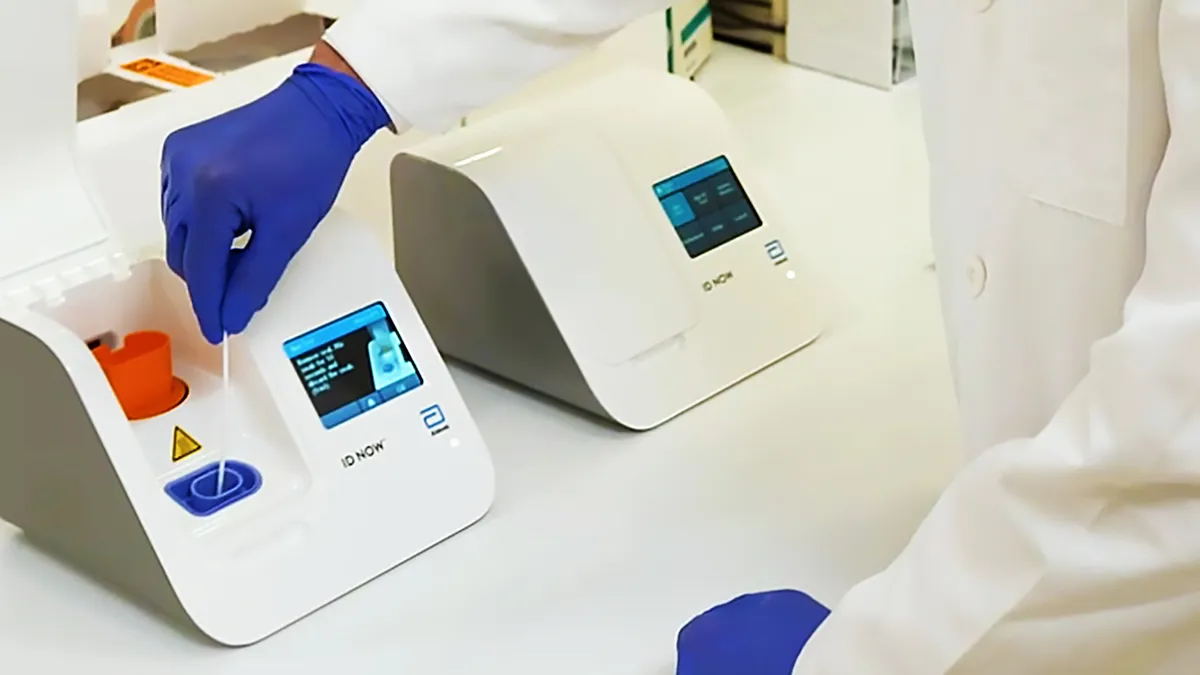Dive Brief:
-
FDA issued an alert late Thursday on Abbott’s rapid point-of-care coronavirus test after a study by researchers at NYU Langone Health became the latest to link the test to a higher rate of false negatives than alternative diagnostics, including one sold by Cepheid. The agency said the findings of more than one study “suggest potential inaccurate results" and it's reviewing 15 adverse event reports indicating some users are generating erroneous results.
-
FDA also said Abbott will conduct a postmarket study of at least 150 patients to better assess accuracy. FDA diagnostics official Tim Stenzel said the test "can still be used and can correctly identify many positive cases in minutes. Negative results may need to be confirmed with a high-sensitivity authorized molecular test."
-
Abbott defended the test's accuracy, arguing the study findings are inconsistent with other research and citing confounding variables that may have skewed the results. Still, it's working with FDA on a customer letter to detail how the test should be used.
Dive Insight:
Whereas PCR tests from competitors such as Roche and Cepheid take 45 minutes to hours to generate results, Abbott contends its ID Now test can detect a person's infection in five minutes, potentially enabling physicians to make more timely decisions.
In its own studies, Abbott found ID Now could reliably detect SARS-CoV-2 RNA at a more accurate level than claimed for Cepheid’s test.
But independent research has raised doubts about its reliability. Last month, researchers at Northwell Health put the ID Now false negative rate 10 percentage points above that of Cepheid’s Xpert Xpress. A Cleveland Clinic study found similar problems with false negatives.
The latest evidence against ID Now comes from a study conducted at NYU that handled samples in a range of ways to counter claims that the high rate of false negatives seen in earlier tests was due to swabs being stored in a manner that Abbott claims reduces sensitivity.
“Regardless of method of collection and sample type, [Abbott] ID Now COVID-19 missed a third of the samples detected positive by Cepheid Xpert Xpress when using [nasopharyngeal] swabs in [viral transport media] and over 48% when using dry nasal swabs,” the NYU researchers wrote in a paper that is yet to be peer reviewed. Abbott said other tests found ID Now misses less than 10% of cases.
The preprint publication of the paper prompted Abbott and FDA to issue statements. Abbott has worked with FDA on a letter to customers advising the use of a confirmatory test if ID Now reports a symptomatic patient is not infected with the virus. To reduce the rate of false negatives Abbott is also “reinforcing proper sample collection and handling instructions.”
FDA needs further reassurance, though, leading to an agreement for Abbott to conduct postmarket studies on “at least 150 COVID-19 positive patients in a variety of clinical settings.” The findings will inform FDA’s efforts to understand the cause of the false negatives and identify actions that it and Abbott can take to mitigate the problem.
Shares in Abbott fell 3% in after-hours trading. Abbott is looking to gains from coronavirus testing to offset slowdowns in other parts of its business in the second quarter. In addition to the test authorized for use on its ID Now system, Abbott has coronavirus diagnostics authorized for emergency use on its m2000 and Alinity m systems, and antibody tests OK'd for use on its Architect and Alinity i systems.










